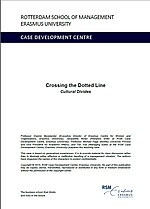
The Chinese Internet giant Alibaba has moved from organic growth to growing through massive M&As in technology and non-technology sectors. Is this seemingly 'reckless' expansion really a lack of focus? What are the key challenges for such high-speed growth?

The Chinese Internet giant Alibaba is transforming from an e-commerce player to a financial service provider. What makes Alibaba’s Internet financial services innovative? What managerial challenges are there for an e-commerce company to run financial services? And what regulatory challenges does Alibaba face?

The Slovenian B2B digital signage startup OOSM decides to enter Western Europe because the home market is too small. However, OOSM only has a founding team from Slovenia, a technical team from Pakistan, and the product is made in China. This combination does not look favorable to potential clients or investors. How can OOSM overcome this problem?

Neticle is a social listening and business intelligence tool based on sentiment analysis technology. After becoming the market leader in Hungary, Neticle considers either entering another geographical area or extending its product portfolio. Both options provide great opportunities but also risks.

American Automotive acquires and merges with BarcelonaBrand Auto. What seemed to be a great strategic deal turns out to be an integration nightmare. What could have gone wrong with this merger in such a short time?

A young Turkish woman at a Dutch-British firm is subject to constant teasing of her appearance by her male colleagues. She considers it harassment and even sexism, but the teasers say it is just good-willed humor. Is it really a form of sexism or does she overreact to cultural differences?

Palo is a successful premium wooden eyewear brand. The expansion of the brand, however, is jeopardized by the lack of financial resources and production delays, as well as internal team conflict. Internal problems are coupled with the increasing competition. Palo is losing momentum and its first-mover advantage. Action is needed immediately if the company is to survive.

After TransferGo – an online money transfer platform – has made its mark in nearly every European country, it decides to take the leap outside of Europe. It cannot decide, however, whether to take the risk and expand radically or be conservative and expand incrementally.

MiniBrake – a German startup that produces a remote-controlled brake system for children’s bikes – is ready to sell its product to a mass market. Should it enter the German home market and rely on specialized bicycle stores to sell the product? Or should it license the technology to an established player in the US who, in turn, would market and sell the product under their brand name?
